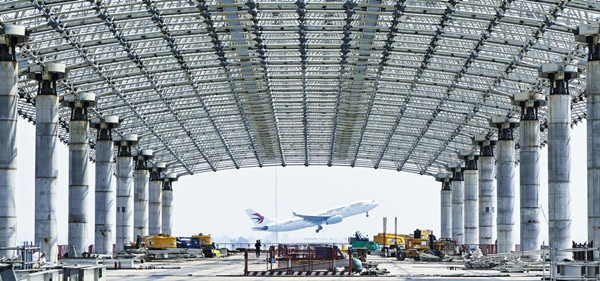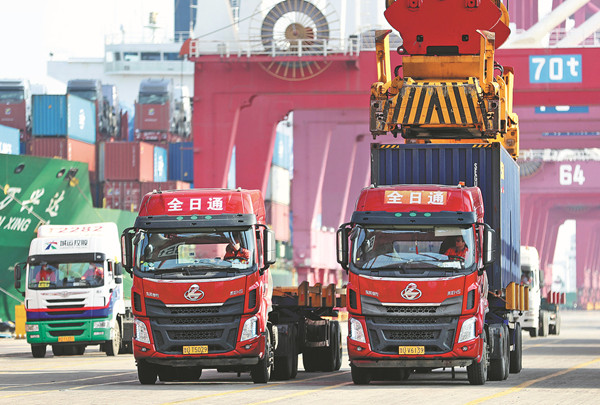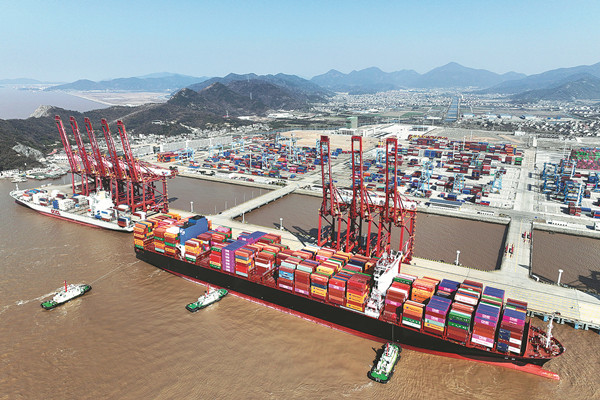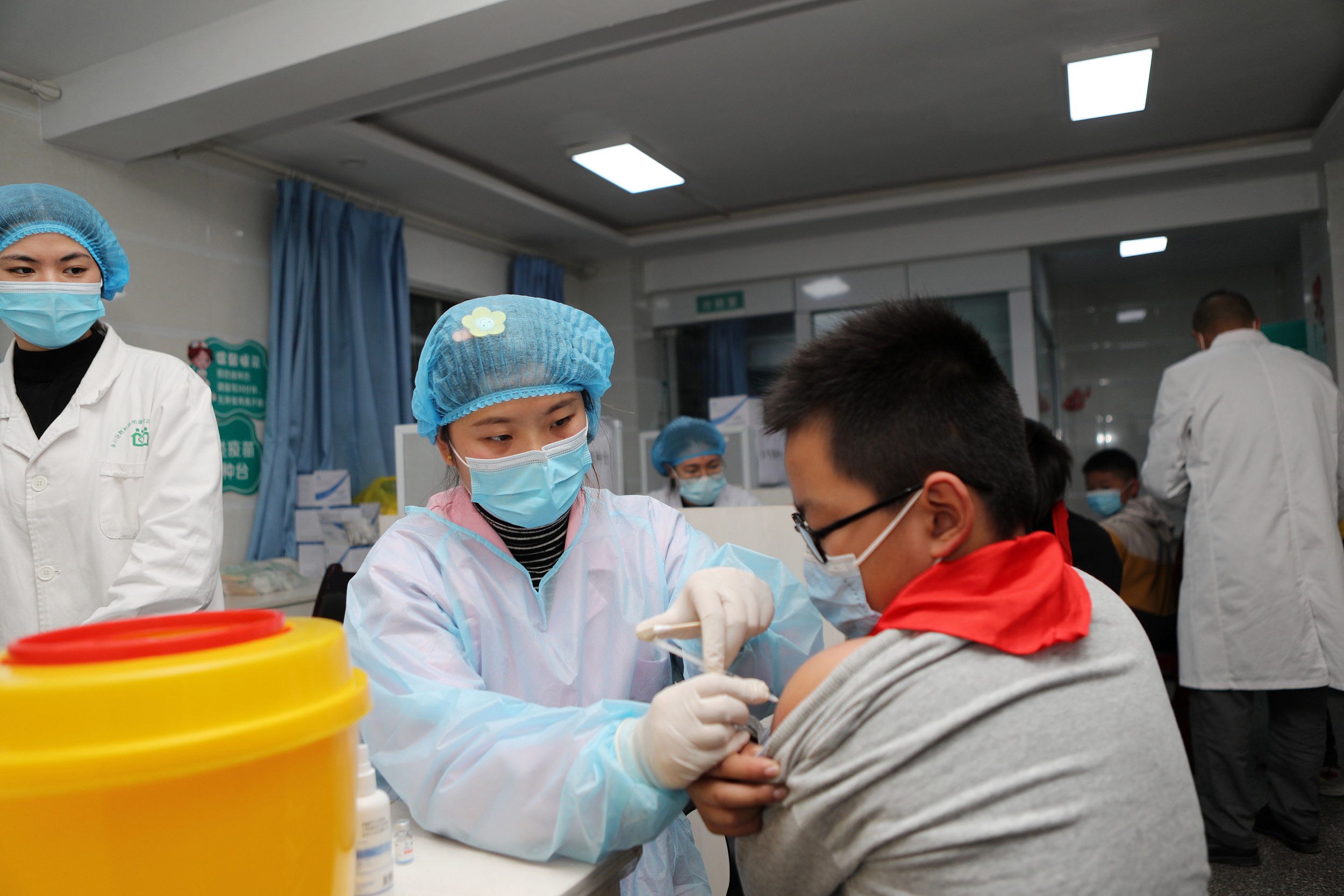MNCs plug into China recovery theme

The Dongsi Corridor of Guangzhou Baiyun International Airport is under construction in Guangdong province on Feb 23. [PHOTO by CHEN JIMIN/CHINA NEWS SERVICE]
As nation sharpens focus on growth, foreign firms ramp up investments, expand operations
As China's ongoing two sessions — the annual sittings of the nation's top legislature and top political advisory body — reaffirm the economic policy's thrust on steady growth, multinational corporations operating in China said they are optimistic about their long-term business prospects. The world's second-largest economy, their top executives said, appears to be on track for a steady post-COVID-19 economic recovery this year.
MNCs such as US materials science company Corning Inc, in fact, are so sanguine that they are ramping up their local investments, expanding their business lines and chalking up medium- to long-term plans for steady growth.
Corning, for instance, is planning to continuously expand its capacity across its various business lines in the country, in order to support growing local demand.
The US multinational specializes in specialty glass, ceramics, related materials and technologies like advanced optics. Its vice-president, Jeffery Liu, said China has always been a strategic market for Corning, which sees huge growth potential in the Chinese market, given the large population of middle-income groups who reside mostly in urban areas.
"I take a rosy view of China's high-quality and innovation-driven development in the next few years," Liu said. "Looking ahead, our company will execute its announced capital projects and expand employment as it ramps up production and invests in new businesses in the China market."
Liu said the China business now accounts for around one-third of Corning's global sales revenue, making the country the largest overseas market for the firm outside the United States.
In the last four decades, Corning has invested over $9 billion in 23 manufacturing and research facilities in China that boast over 6,000 employees now.
It has been continuously investing in Chongqing, first on a post-processing plant, then on a logistics center, and now on a melting furnace, as well as other facilities for new materials.

Container trucks deliver goods at Qingdao Port in Shandong province on Feb 16. [PHOTO by ZHANG JINGANG/FOR CHINA DAILY]
Besides the investment in glass melting production lines, Corning is actively expanding in the upstream raw materials industry. It is also expanding investment in Chongqing with Gorilla cover glass and Corning automotive glass, one for consumer electronics and the other for automotive innovations.
Experts attribute such strong commitment to the Chinese market to the country's emphasis on its pro-growth stance, the latest evidence of which is the around 5 percent GDP growth target set for 2023. On Sunday, delivering the annual Government Work Report, Premier Li Keqiang said the nation will focus on intensified and more targeted macroeconomic policies to promote stable economic growth.
China is also giving priority to substantially expanding domestic demand and boosting market confidence, offering rising growth opportunities for global stakeholders such as Corning.
Seeing the huge growth potential in China's ultra-large domestic market, Corning's Liu said he believes the China market will continue to serve as a major growth engine for the company's future development.
China has become the world's second-largest consumer market, boasting a middle-income group of over 400 million people. China's retail sales totaled 43.97 trillion yuan ($6.37 trillion) in 2022, data from the National Bureau of Statistics showed.
China remains an important global manufacturing base as well as a key consumer market for products such as TVs, cars and smartphones, and there has been a huge demand for glass in those sectors.
After years of development, Corning is planning to gradually expand its research and development capability in China in the next five to 10 years, in a bid to better cater to the local demand, Liu said.
"We're very bullish about China's long-term prospects. During the past decades, Corning has benefited a lot from China's reforms and opening-up. China is one of the most appealing destinations for foreign investors," he said.
Citing key tasks mapped out by China's 14th Five-Year Plan (2021-25), he said China aims to foster high-quality and innovation-driven development in the coming years. And Corning, with its innovative initiative, will play an increasingly important role in supporting China's high-quality development in this period.

A cargo ship docks at a container terminal in Zhoushan, Zhejiang province, on Jan 28. [PHOTO by YAO FENG/FOR CHINA DAILY]
"China's economy is expected to grow by 5.7 percent this year, contributing to around 40 percent of the global economic growth," said Robin Xing, Morgan Stanley's chief China economist.
China will play a key role in boosting global economic growth this year, and China's growth prospects will have positive spillover effects on other economies in areas like trade and tourism, Xing said.
"Both the United States and Europe may face a year of subdued growth, and China, with an anticipated 5.7 percent growth in 2023, will benefit them a lot," Xing said.
Europe, he said, will likely benefit from the huge demand for midrange to high-end luxury goods in the China market, and Chinese outbound tourism spending will benefit many economies and sectors, especially in Asia.
"A cyclical economic recovery in China is starting to unfold," said Hong Hao, chief economist at Grow Investment Group. "High-frequency data show that traffic congestion and subway crowds in big cities have rebounded to near-normal levels."
Nomura noted in a recent report that China's national domestic tourism trips and revenues jumped by 23.1 percent and 30 percent year-on-year, respectively, during the Spring Festival holiday (Jan 21-27), while national retail and catering revenues reported by key enterprises rose by 6.8 percent year-on-year during the holiday, which is well above the 1.8 percent decline in retail sales reported in December by the NBS.
Given China's higher-than-expected 2.9 percent GDP growth in the fourth quarter of 2022, the optimized measures to control the pandemic, and the strong rebound of in-person services during the Chinese New Year holiday, Nomura recently raised its 2023 China GDP growth forecast to 5.3 percent from 4.8 percent.
Luo Zhiheng, chief economist at Yuekai Securities, noted most provincial-level regions have set their 2023 annual GDP growth target between 5.5 percent and 6.5 percent, showing strong optimism for a robust 2023 and sending a clear message of their determination to revive the COVID-19-battered economy this year.
"China's economy will likely expand by over 5 percent this year," he added. "The first-quarter growth may prove to be the lowest in 2023, followed by an estimated robust growth of over 7 percent growth in the second quarter."
He warned of pressure and risks from a cloudy global outlook, slowing external demand and the weak property sector, saying expanding domestic demand, including both consumption and investment, as well as boosting market confidence, will be the priorities for stabilizing the overall economy.
Luo said China needs to further step up fiscal and monetary policy support for propping up growth this year, including forceful infrastructure spending, stabilizing the property market and a series of policies to optimize the business environment.
"To spur consumption, it is advisable for the government to issue more consumption coupons and send cash to citizens," he said. "More importantly, the government should take key measures to boost the spending power, including reforms in the distribution of national income, reducing the gap between the rich and the poor and improving the composition of fiscal spending."
When it comes to expanding the investment, the country needs to speed up the implementation of major projects mapped out by the 14th Five-Year Plan, Luo said.
Positive signs are already indicating the gradual normalization of economic activities in China.
A new report released by Standard Chartered Bank showed that the China SME Confidence Index rebounded to 51.4 in February from 49.9 in January, ending four straight months of contraction and hitting the highest level since July.
Notably, the recovery in the services sector was more significant than that in manufacturing. The performance subindex for services of SMEs surged to 50.4 in February, returning to expansion territory for the first time since September.
Zhou Maohua, a macroeconomic analyst at China Everbright Bank, said the report shows that SMEs, which play an irreplaceable role in creating jobs and propel economic growth and scientific innovation, are optimistic about China's growth prospects.
He also said some SMEs still face difficulties and challenges, adding the government needs to continuously implement stimulus policy measures to ease financial burdens of enterprises, stabilize growth, and ensure stable prices and supplies. More efforts should also be made to tackle issues faced by SMEs such as financing difficulties.
Despite pressures and challenges from slowing external demand, China will likely record an over 5 percent GDP growth in 2023, given its optimized COVID-19 control measures, a package of stimulus measures taking effect gradually and the low comparison base of the previous year, he said.
Zhou Lanxu contributed to this story.





 Sketching and creation tour in Baotou
Sketching and creation tour in Baotou